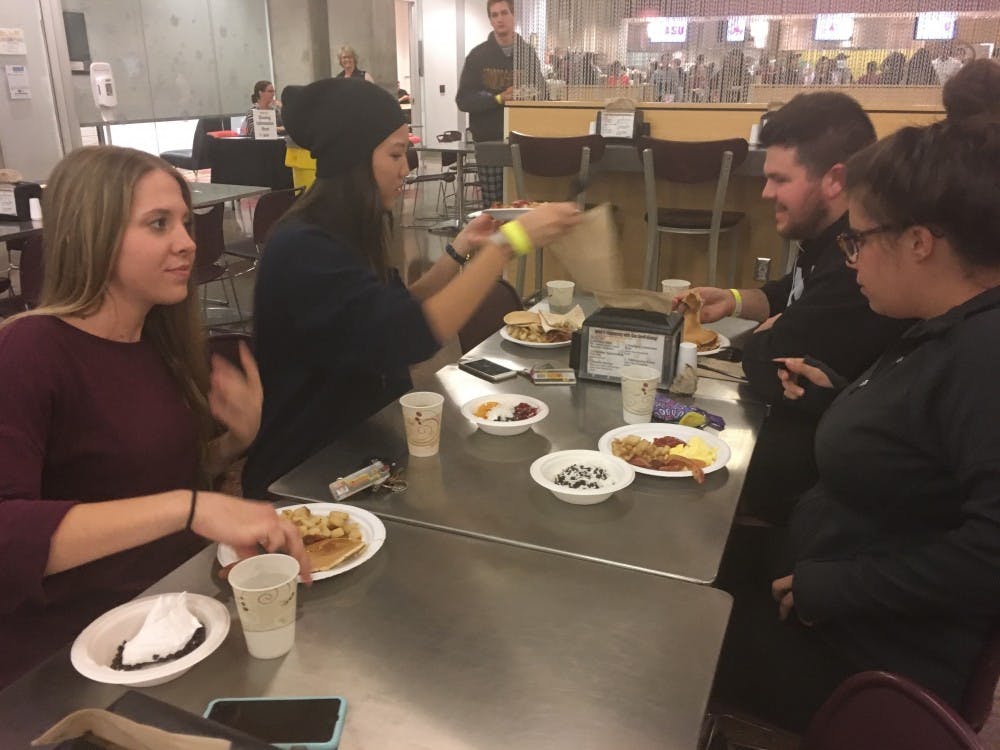ASU students are feeling the pressures of finals week taking a toll on their mental health.
In a survey of 100 students across all four main campuses, The State Press found that over half of respondents described their stress level about finals as 7 or above on a 1-10 scale, 10 being the highest. Almost all respondents claimed their stress for finals outweighed the rigor of their course load.
Aaron Krasnow, associate vice president of ASU’s health and counseling services, works to help students push through these stressful times.
“Around this time, we do not see an increase in people seeking out counseling services, but we do see an increase in students concerned with (their academic standings)," he said.
Some students, he said, believe studying longer and harder will help them retain the information better, but they reach a point where that backfires, leaving them more stressed than before with little to show.
In response to the prevalence of this issue, ASU attempts to provide some services to students under large amounts of stress.
On Nov. 30 at 8 p.m., dining halls across all four campuses opened for a two hour period to serve a late-night breakfast.
“It’s a way to reward students and to give them the opportunity to eat and then get back to studying at night,” said health sciences junior Sophia Acosta, a change agent at Changemaker Central on the Downtown Phoenix campus.
Changemaker has facilitated and promoted such events for finals week in the past.
“All campuses do it,” she said. “It’s a big thing for residence halls, but students who go to ASU but don’t live on campus can go as well.”
Acosta said the goal of the service was to promote a healthy studying atmosphere.
Officials from ASU counseling services say the best way to reduce stress from finals is to live through them as healthily as possible.
"How many of you are ready for finals?” asked ASU counselor Rhonda Pruitt to a group of students during a “Fear-Less Finals Life Hack” presentation. The students all answered that they were not ready.
The life hack sessions — a new support program initiated this year — gives small groups of students exercises and tools to reduce their anxiety.
Some stress, Pruitt said, can be beneficial and motivate students, despite discomfort.
“(Some stress) is useful to propel you forward,” she said. “But distress is ... when your stress is to the point that it’s not helpful anymore and it’s taking away from what you need to be successful.”
Pruitt emphasized the importance of sleep during finals, as alternatives like coffee often makes students jittery and strung out, while leading to an inevitable crash.
However, despite her emphasis on proper sleeping habits, only a third of respondents to The State Press' survey said they would not pull an all-nighter before the end of the semester.
Social work junior Natalie Kostelisch is one of these students. Interviewed after taking the survey, Kostelisch said the stress mainly came from being aware of all she had to do.
“It’s just a lot,” she said. “I’m stressed out, but it’s just because I have so much. Even though I’ve got the notes for it, I found I don’t remember it so well.”
She said the main issue was that all of the tests were given at the same time, leaving less time for preparation.
“When it’s two or three (classes), that’s fine, but when it’s (all of them) at one time, trying to remember it, there’s still things in there that I need to remember that I’m not remembering,” she said.
Kostelisch said she deals with the stress through yoga.
“It’s just relaxing. I found a program on at night that tells you (the steps),” she said. “I never thought it would help, but when I do it, i can feel my body relax. As I sat there and did it, I felt my muscles and shoulders relax in my body and I thought ‘oh, gosh, this helps.’”
Reach the reporter at ckmccror@asu.edu or follow and @ckm_news on Twitter.
Like The State Press on Facebook and follow @statepress on Twitter.






